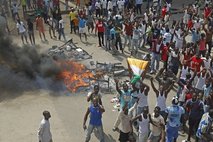 |
| Picture Credit: lepoint.fr |
In June 2011, the International Criminal Court (ICC) Prosecutor Luis Moreno Ocampo, requested the ICC judges authorization to open up an investigation into crimes allegedly committed during the post election violence in Côte d'Ivoire since November 2010. According to the application of the Prosecution at least 3,000 persons were killed, and over 100 raped. The application also includes disappeared persons and over 500 cases of arbitrary arrest and detention. The number of unreported incidents is believed to be significantly higher. The application includes reasonable basis to believe that crimes have been committed by forces from both sides of the conflict, those loyal to former President Laurent Gbagbo as well as of his rival President Alassane Outtara.
Under the Rome Statue the prosecutor is allowed to open an investigation on the basis of a referral from a State Party to the Statute, or a referral from the UN Security Council. Additionally, as in this case, the Prosecutor may initiate an investigation on his own initiative, proprio motu, based on information received from either individuals or organizations, of crimes which fall under the jurisdiction of the court.
On October 3, 2011, Pre-trial Chamber III granted authorization for the Prosecutor to open an investigation into the crimes allegedly committed in Ivory Coast since November 28, 2010. This is the first time the ICC has opened a case in State that is not a member to the Court, subsequent to a recognition of jurisdiction by Côte d'Ivoire. All other ICC cases have been referred to the court by the Security Council or otherwise relate to crimes committed on the territory of a State Party to the Rome Statute.
The articles and documents below track the developments of the ongoing ICC investigations in Ivory Coast.
Documents
Declaration under article 12-3 of the Rome Statute, 18 April 2003
Letter reconfirming the acceptance of the ICC jurisdiction, 14 December 2010
On both 14 December 2010 and 3 May 2011, the Presidency of Côte d'Ivoire reconfirmed the country’s acceptance of the Courts jurisdiction.
Articles
2011
ICC Prosecutor to Probe Six in Ivory Coast (October 16, 2011)
The International Criminal Court (ICC) will investigate three to six, still unnamed, individuals in Ivory Coast for their actions during the conflict that killed over 3,000 people after last November’s election. This is the first time the ICC has opened up a case in a state that is not a member to the court, following a recognition of jurisdiction from the nonmember state. The chief prosecutor, Luis Moreno Ocampo, says that this is the first time they have a good relationship with the national authorities. The investigation is the court’s seventh; all previous investigations took place in Africa and, so far, none of them have reached a verdict. (Associated Press)
Côte d'Ivoire: ICC Judges OK Investigation (October 3, 2011)
The international criminal court (ICC) has allowed the prosecutor to open an investigation on the post-election killings and rapes in Côte d'Ivoire. The prosecutor, Luis Moreno-Ocampo asked judges’ authorization in June to investigate crimes allegedly committed by forces from both sides of the conflict, those loyal to Laurent Gbagbo as well as of his rival, Alassane Ouattara. Although Côte d'Ivoire is not a state party to the ICC, the Ivorian government has submitted a declaration giving the court jurisdiction for crimes committed after 2002. This is the courts seventh formal investigation; all of them examine crimes in African countries. (Alertnet)




